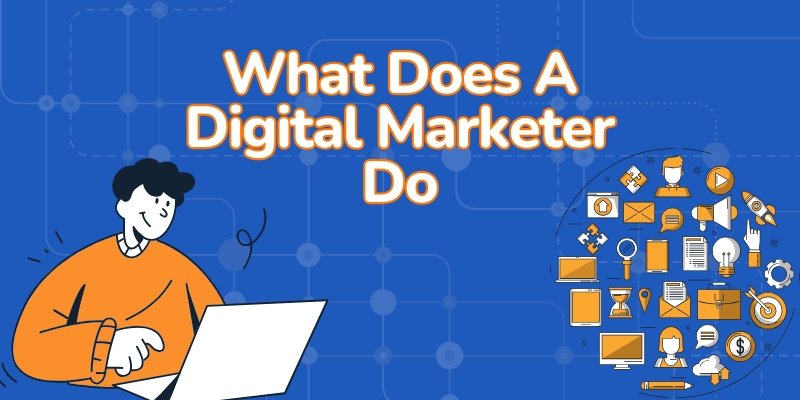Digital marketers have different daily tasks depending on their job role, the size of the company they work for and the industry they are in.
Digital marketing involves various online methods and platforms that businesses use to reach their audience, promote their products or services and meet their goals. It’s a constantly changing field that uses digital tools to connect with and engage people online.
Let’s look at the daily tasks of a digital marketer and understand how digital marketing fits into a range of different roles and responsibilities.
The best digital marketers are always learning and adapting to new trends and technologies.
Role of a Digital Marketer
A digital marketer uses online channels to promote products, services or brands. Their work includes managing social media, search engines, email, content creation and online ads.
The main aim of a digital marketer is to connect with the target audience, boost engagement and achieve business goals through digital methods.
In today’s digital age, digital marketing keeps changing. Traditional marketing methods have merged with digital platforms, creating a more dynamic and data-focused approach. With AI and the move towards personalization digital marketing has become a crucial part of marketing.
Digital marketing includes many roles, some highly specialized and others more general.
In a generalist role, a digital marketer might handle content creation, manage social media, optimize websites, run online ads and analyze data. In a specialized role, they may focus on just one area like social media marketing, search engine optimization, content marketing or email marketing.
A digital marketer’s job is diverse and flexible playing a key part in increasing online visibility, engagement and business success.
Key Responsibilities (With Examples)
Whether you are a specialist or a generalist in digital marketing, there are many responsibilities you might have. Here are some examples of key duties for a junior or mid-level digital marketer in different specializations:
Content
Content creation and management involve planning a content strategy for your brand and making engaging content for different platforms. A content manager’s or creator’s typical responsibilities include:
- Writing copy for a new landing page for an upcoming company webinar.
- Creating blog posts about topics related to your company’s products or services.
- Adding product descriptions to the website with a strategy to boost organic traffic and build awareness.
Search Engine Optimization (SEO)
In an SEO role you create strategies to improve search rankings and track performance using tools like Google Analytics and Google Search Console. You also research keywords to ensure the content matches what your audience is searching for.
Common tasks for an SEO strategist include:
- Conducting keyword research and applying on-page and off-page SEO tactics for a client.
- Working with content creators to make content search engine friendly.
Search Engine Marketing (SEM)
Search Engine Marketing involves digital ads on different platforms. You’ll run SEM campaigns to boost traffic and sales.
Common tasks for an SEM strategist include:
- Creating and managing pay-per-click (PPC) ad campaigns.
- Doing keyword research for ad targeting.
- Monitoring ad performance and adjusting bidding strategies to improve ROI.
Social Media Marketing (SMM)
A social media specialist or manager focuses on using social media platforms to engage with audiences and manage a brand’s presence.
A social media marketer’s typical responsibilities include:
- Creating and scheduling engaging content for different social media platforms.
- Monitoring social media channels for trends, interactions and engagement.
- Replying to comments and messages helps build a sense of community.
Email Marketing
Email marketers focus on using email to target audiences and improve the brand’s email strategies.
Common tasks for an email marketer include:
- Designing and running email campaigns like newsletters and promotional emails.
- Segmenting and managing email lists to target specific groups.
- Analyzing email campaign results and suggesting improvements.
Data Analysis & Reporting
Digital marketing relies heavily on data, requiring marketers to review and report analytics to their superiors.
Typical duties for a digital marketer who uses data include:
- Using analytics tools to track and analyze website and campaign performance.
- Creating regular reports on key performance indicators (KPIs).
- Offering insights and recommendations based on data analysis.
Data is at the heart of our decision-making process, ensuring that every strategy we implement is backed by solid insights and analytics.
As a generalist, you might handle tasks from various roles mentioned above depending on your company’s size and your position within the marketing team.
Tools for Marketing
Digital marketers use various tools for managing customer relationships, optimizing websites and finding new marketing opportunities. Here’s a list of common tools they often use:
Social Media Marketing Tools
- Sprout Social
- Social Pilot
- Loomly
- Agorapulse
- Hootsuite
- Buffer
- Facebook Business Manager
Email Marketing Tools
- MailChimp
- Constant Contact
- SendGrid
- Moosend
Customer Management Platforms
- Salesforce
- Hubspot
SEO & Website Analytics
- SEMRush
- Ahrefs
- Clearscope
- Moz
- Google Search Console
- Google Analytics
Conversion Optimization Tools
- Unbounce
- Optimizely
- Hotjar
Landing Page & Lead Capture Tools
- Typeform
- MailMunch
Graphic Creation Tools
- Canva
- Visme
Digital Advertising
- Google Ads
- Facebook Ads Manager
These tools help digital marketers in various parts of their campaigns, from analytics and SEO to social media management and email marketing.
Skills for Marketing
Marketers need to understand digital platforms and possess additional soft skills. They must adapt to new technologies, work well under pressure and blend technical knowledge with creativity.
1. Hard Skills
- SEO
- Content strategy
- Brand management
- Social media strategy
- UX and UI
2. Soft Skills
- Tech savvy
- Adaptable
- Problem solver
- Curious
- Strategic
- Tactful
- Creative
- Persuasive
- Passionate
At Sid Web Solutions, we believe in pushing the boundaries of digital marketing with innovative strategies tailored to your brand’s unique needs.
Biggest Challenges in Marketing
Digital marketing is always changing and advancing. Marketers need to stay updated on the latest trends and technologies while balancing creativity with data-driven decisions.
Some challenges include:
Keeping Up with Technology & Trends
The digital world changes quickly with new technologies, platforms and trends.
Example: Staying updated on the latest algorithm changes on social media or adapting to advancements in AI affecting search engine algorithms.
Balancing Creativity with Data
Finding the right mix of creative marketing and data-driven decisions can be tough.
Example: Making sure creative content matches data insights to boost both user engagement and performance.
Adapting to Algorithm Changes
Algorithms on platforms like Google, Facebook and Instagram often change affecting organic reach and ad strategies.
Example: Adjusting SEO strategies when search engine algorithms update to keep or improve website rankings.
Attribution & Measuring ROI
Figuring out the effectiveness of different marketing channels and accurately attributing conversions can be challenging.
Example: Assessing the impact of each touchpoint in a customer’s journey and accurately measuring ROI for various campaigns.
Managing Data Privacy & Compliance
Strict data privacy regulations require marketers to handle customer data carefully.
Example: Ensuring compliance with data protection laws like GDPR and CCPA and using transparent data practices in campaigns.
Adapting to Platform Changes
Social media and advertising platforms often introduce new features and trends that need quick adaptation.
Example: Updating content strategies to use new features like Stories or Reels on Instagram.
Content Saturation & Quality
The large amount of online content makes it hard to stand out and consistently produce high-quality content.
Example: Creating unique and valuable content that connects with the audience despite the competition.
Budget Constraints & Resource Allocation
Effectively distributing budgets across various digital channels while managing advertising, technology and tools costs.
Example: Optimizing ad spending based on performance metrics and ensuring resources are well-distributed for different marketing activities.
To overcome these challenges, marketers must stay informed, be adaptable and combine creativity with data-driven insights. Successful digital marketing requires addressing these obstacles effectively.
Typical Career Progression
From entry-level roles to executive positions, digital marketing offers various career paths. Your progression depends on your goals and the roles you enjoy.
Entry-Level Positions
Job Titles: Digital Marketing Assistant, Social Media Coordinator and Content Coordinator.
Roles: Entry-level marketers usually start with specialized tasks such as managing social media, creating content or handling email marketing. They gain hands-on experience and learn about different digital marketing channels.
Specialized Roles
Job Titles: SEO Specialist, Paid Media Coordinator and Email Marketing Specialist.
Roles: With more experience, individuals move into specialized roles focusing on specific areas like SEO strategies, paid advertising campaigns or email marketing.
Mid-Level Positions
Job Titles: Digital Marketing Specialist, Social Media Manager and Content Strategist.
Roles: Mid-level marketers take on strategic responsibilities, oversee campaigns, develop strategies and manage teams. They analyze data, optimize performance and contribute to broader marketing goals.
Managerial Roles
Job Titles: Digital Marketing Manager and Marketing Manager
Roles: Managers lead teams, plan and execute campaigns and ensure performance aligns with the organization’s goals. They work with other departments and set marketing objectives.
Director/Head of Digital Marketing
Job Titles: Director of Digital Marketing and Head of Digital Marketing
Roles: At this level, professionals oversee all digital marketing efforts within an organization. They make strategic decisions, allocate budgets and implement high-level marketing initiatives. Leadership and strategic vision are key aspects of this role.
Chief Marketing Officer (CMO)
Job Title: Chief Marketing Officer
Role: Some digital marketers advance to the CMO role, leading the entire marketing department including digital and traditional marketing. CMOs shape the brand’s image and contribute to the overall business strategy.
Digital marketing is growing quickly as technology evolves. Projections show digital advertising revenue will exceed $700 billion by 2025, a big jump from $153 billion in 2022.
If you want to become a digital marketer, now is a great time to start!


